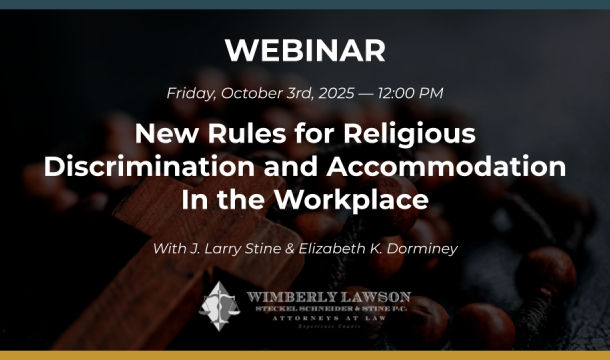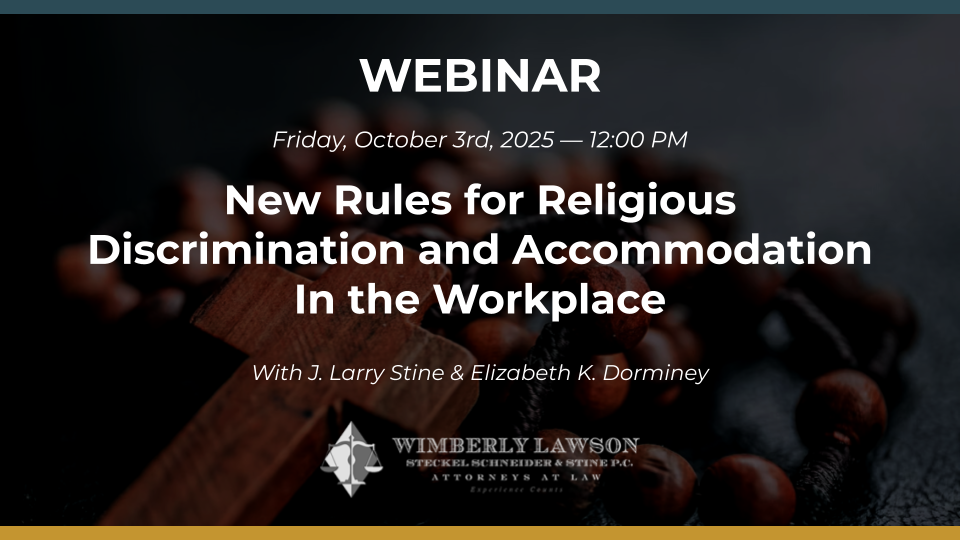FEARLESS FORECAST AS TO TRUMP LABOR EMPLOYMENT INITIATIVES
1. Immigration – Allow DACA (Deferred Action for Childhood Arrivals) slowly to expire by allowing current work permits to continue but not issuing new ones. Durbin/Graham are proposing new bipartisan legislation for provisions protecting presence for three years to all immigrants in DACA program. Direct the Labor Department to investigate visa (such as H-1B) abuse without dismantling programs. Expand E-Verify. Possible restitution of workplace raids of illegal immigrants.
2. Obamacare – Maintain 26 years for dependents and barring exclusions for pre-existing conditions. Move slowly to find eventual replacement. Delete Cadillac Plan penalty and eventually other penalties as well.
3. Salary Overtime Rule – It is already subject to a federal injunction and may be dead. The rule may be killed by failing to defend it or using Congressional Review Act, but pro forma congressional sessions in December may cause problems to the latter and AFL-CIO attempting to intervene in the court litigation to defend the salary overtime rule.
4. NLRB – Two of the five seats are vacant, and so the President may fill those two seats with Republicans and create a 3-2 Republican majority, subject to Senate confirmation, during 2017. But NLRB general counsel position may not become vacant until November 4, 2017.
5. EEOC – Democrats may retain a majority on the five-member commission for the first half of 2017, but Republicans could bring about a new majority as early as July 2017.
6. New EEO-1 Form Requiring a Summary of Pay Data – Obligations start March 31, 2018. Plenty of time for Republican majority to rescind or modify.
7. LGBT Issues – The Obama Administration took the position that a ban on sex discrimination extended to these factors, but whether they constitute sex discrimination under Title VII is unclear. The same with "bathroom" issue. The new Administration may await court rulings, but can nominate new EEOC general counsel right away.
8. GIG Economy Issues, Including Independent Contractor and Joint Employment – The new Administration can issue new "guidance" on these issues, negating expansive interpretations made by the Obama Administration. NLRB issues will take more time, as current NLRB general counsel remains in office until November of 2017 and cases must arise dealing with these issues.
9. OFCCP (Government Contractor) Rules – Possible review of 2014 changes regarding disabled individuals and military veterans, but new rule making procedures take one-two years. Most likely candidate for rescission is the Obama Fair Pay and Safe Workplaces Executive Order requiring disclosures of past labor and employment law violations, which are already the subject of a preliminary injunction from a federal court. Note that one portion of this rule requires businesses with contracts worth at least $500,000.00 to provide wage statements to certain workers, detailing their total and overtime hours, pay rates, gross wage and any itemized deductions, and also to inform independent contractors of their status as non-employees. This portion of the rule goes into effect January 1, 2017, and is not part of the court injunction. The new Administration could simply discontinue defending various rules in court. OFCCP under the new Administration will likely go back to more desk audits rather than lengthy on-site investigatory audits. Also, the government is likely to discontinue publishing violations and settlements with intent of "public shaming."
10. New DOL Persuader Rule Requiring Public Reporting of Payments to Consultants and Attorneys for Labor Advice – It is already subject to a federal injunction and likely dead.
11. Presidential Executive Orders – Prior Executive Orders can be overturned by the new Administration quickly, with the Fair Pay and Safe Workplaces Executive Order being at the top of the list, followed by the Executive Order on project labor agreements, with the Executive Order establishing paid sick leave for employees working on federal contracts as another possible candidate.
Note: In case of regulations the new Administration doesn't like, options include issuing new regulations which take one-two years, passing legislation, or blocking new regulations via the Congressional Review Act.
Related Content
Get Email Updates
Recent Content

New Rules for Religious Discrimination and Accommodation In the Workplace

TPS Update (as of 9/3/2025)

DOL To Shut Down OFCCP and Transfer Duties to EEOC

Meaning of Supreme Court Ruling Limiting Nationwide Injunctions in Birthright Case

In Spite of Adminstration Changes, Monitoring of the Workplace Continues to Create Legal Issues

